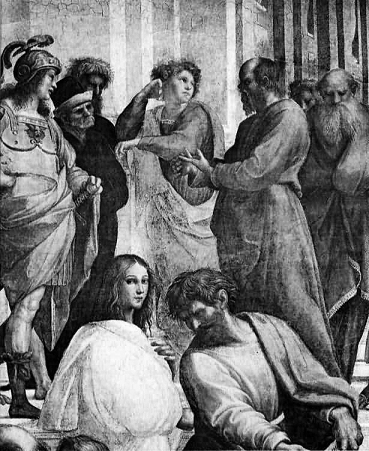
Socrates was born an Athenian in the year 469 B.C. His father was Sophroniskus, who was a sculptor as profession. Although his family had a respectable name, their financial status was only ordinary. Socrates’ education was considered the norm as an Athenian citizen, consisting of readings of Greek poems, language arts, arithemetic, and a bit of astronomy. With the exception of his philosophy, the actual details of the man’s life is mostly unknown. He was known to have served as a hoplite, or foot-soldier, at the siege of Potidea, at the battle of Deliurn, and Amphipolis, suggesting a courageous and fortitudinous nature.
Sometime in the middle portion of Socrates’ life, he retired from his position as statuary. He became a scholar and philosopher. Yet, he opened no school for study, nor did he begin teaching. He disclaimed the social statuses of teacher and pupil and more appreciated the exchange of information through everyday conversations. Portions of his day would consist of walking the streets, exercising at the local gymnasium, sitting in on school lectures, and maybe even show up at the town marketplace. His daily habits was normally conducted in a public manner. Many found him to be intelligent and interesting, attending his public chats daily.
Legend has it that Chaerphon, a wise man and great friend to Socrates had once consulted the oracle at Delphi as to whether any man was wiser than Socrates. The priestess had relplied “no.” This answer perplexed Socrates extremely. He knew for a fact that he truly possessed no great wisdom on any subject or aspect of life. In the end, he put the matter to test, by comparing his wisdom to other men. He soon discovered that the oracle had meant that wisdom was acknowledging the lack of wisdom. The act of making oneself superior to others is not wisdom. Thus follows, he considered it his duty, dealt by the Delphian god, to cross examine men of all statuses, making them conscious of their ignorance. Socrates would, through this method of questioning, transfer degrees of homely precepts including self-control, temperance, piety, duty to family, and diligence. It seemed to Socrates that the true purpose of thinking is to be directed to human relationships. He once proclaimed “the proper study of mankind is man.”
In 400 B. C., an indictment was laid against Socrates on the terms of not worshipping the gods, introducing new gods to the public, and corrupting the youth. This trial takes place as written in Plato’s The Apology. The man was eventually sentenced to death. In the end, he declared that his life and destiny is founded and perceieved by the heavens, and that death may only be a step towards goodness. The last day of his life he passed conversing with his friends on the Immortality of the soul. He then drank hemlock poison, passing away.
